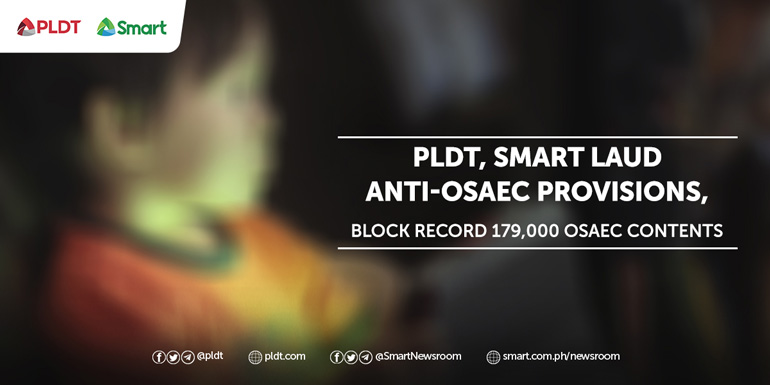As cases of human trafficking and online sexual abuse and exploitation of children (OSAEC) continue to rise in the country, PLDT and Smart laud government measures to amend legislation and strengthen multi-sectoral solutions to curb illegal sex trade that involves Filipino children online.
Congress recently approved in a Joint Session the amendment to the anti-human trafficking legislation that harmonized Senate Bill 2499 and House Bill 10658. This version now includes strengthened provisions against OSAEC, which will effectively address earlier limitations on the implementation of Republic Act (RA) 9775, otherwise known as, the Anti-Child Pornography Act of 2009.

Despite limitations on the existing law, PLDT and Smart continue to uphold the child protection principles of RA 9775 and invested in a Child Protection Platform that allows them to detect, respond, and prevent domain and content-level access to OSAEC within their network. Through their alliances with various intelligence entities such as the Internet Watch Foundation and the Canadian Centre for Children Protection, PLDT and Smart were able to block an accumulation of over 179,000 OSAEC URLs, as of January 31, 2022.
In a statement, PLDT First Vice President and Head for Regulatory and Strategic Affairs, Atty. Aileen Regio, thanked legislators for actively pursuing an inclusive consultation process and enacting changes necessary to make the law more adaptive and responsive to the ever-changing technology landscape.
“This amendment legislation has a clear understanding of the entire digital ecosystem that enables human trafficking and OSAEC and makes a precise distinction on the roles of the different entities, especially recognizing intermediaries that are in a better position to manage content that are housed through their platforms,” said Regio.
PLDT and Smart earlier joined fellow Internet Service Providers (ISP), via the Philippine Chamber of Telecommunication Operators, in urging the government for clarity and legislative amendments to Section 9 of RA 9775 as it imposes conflicting provisions on ISP measures for content filtering and data privacy protection.
Read More: PLDT, Smart fortify network rollout in 2021
PLDT and Smart have also enacted a pioneering Child safeguarding Policy that institutionalizes programs, practices, and technology solutions that promote the online safety and welfare of children across their operations.
These initiatives underscore their continuing commitment to help the Philippines in attaining the United Nations Sustainable Development Goals (UNSDG), particularly UNSDG #16 which stands against abuses, exploitation, trafficking, and violence against children and promotes just, peaceful, and inclusive societies.
Featured Image: Unsplash





1 Comment
Of course I support the intent, but I have hit it a couple of times where an entire domain is blocked. Like a file sharing service. This blocks legitimate content as a false positive. I would rather see specific blocks of known offending material and an actual legal response to repeat offenders. Close the loop instead of a national Net Nanny.